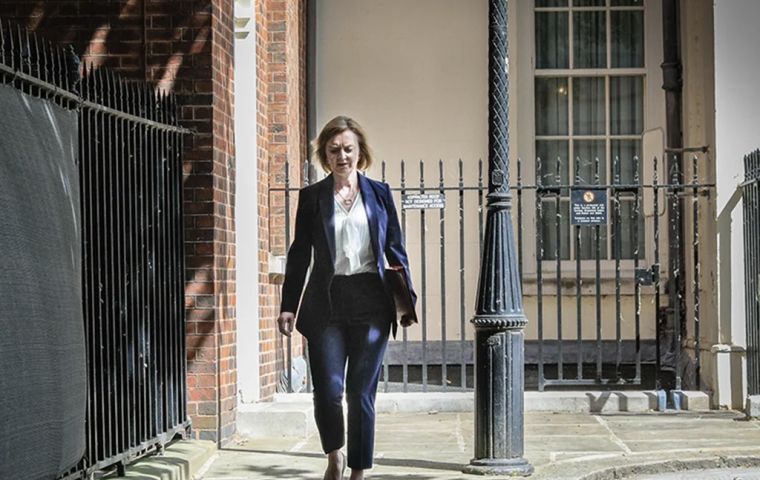MercoPress. South Atlantic News Agency
PM Truss U-turn on tax cuts, names new Chancellor, to avoid her own sacking
 On Friday, at a hastily arranged press conference, Truss announced a U-turn on a planned tax cut that was one of her major policy projects
On Friday, at a hastily arranged press conference, Truss announced a U-turn on a planned tax cut that was one of her major policy projects After only turbulent 38 days and a quick return from Washington, Britain's Chancellor of the Exchequer on Friday was fired and a former foreign minister Jeremy Hunt was appointed to replace him.
“You have asked me to stand aside as your chancellor. I have accepted,” Kwasi Kwarteng wrote in a letter to PM Liz Truss.
The prime minister replied: “I deeply respect the decision you have taken today. You have put the national interest first ... I know that you will continue to support the mission that we share to deliver a low tax, high wage, high growth economy.”
Later on Friday, at a hastily arranged press conference, Truss announced a U-turn on a planned tax cut that was one of her major policy projects, arguing that there was a “need to act now to reassure the markets.”
“I have therefore decided to keep the increase in corporation tax that was planned by the previous government,” Truss said in reference to her predecessor, Boris Johnson, and the former finance minister, Rishi Sunak, who she defeated in the Conservative leadership contest.
Truss and Kwarteng have been scrambling to reassure markets and lawmakers after a September 23 tax-cutting “mini-budget” that plunged the UK into a major financial storm, forcing a quick intervention of the Bank of England in support of bonds.
Kwarteng had been in Washington for annual talks with the International Monetary Fund and before leaving the US capital, Kwarteng insisted he was safe in his role as Chancellor of the Exchequer.
However, Truss had reportedly already been seeking a replacement to stave off threats to her own job. In a major U-turn on the mini budget she was reversing aspects of her controversial plans.
In September, Kwarteng announced tax cuts — twinned with heavy borrowing — that spooked markets. The announcement sent interest that the government would have to pay on borrowing soaring while the pound slumped to a record low.
Jeremy Hunt has become the UK's third finance minister in less than two months, replacing Kwarteng, who had been in the role for less than six weeks.
A former foreign minister, Hunt has twice been unsuccessful in running for the ruling Conservative Party's leadership. He lost out to Boris Johnson in the summer of 2019, and was then being knocked out in the first round of voting in a contest which saw Truss get the job earlier this year.
Viewed as someone on the center-right of the party, Hunt endorsed Truss's leadership rival Rishi Sunak in the race to become prime minister. Hunt advocated remaining in the European Union, ahead of the 2016 Brexit vote which eventually saw the UK leave the bloc.
However the financial and political chaos has fueled speculation about whether Truss can survive in office after less than 40 days as prime minister. Truss — the fourth prime minister in six years in Britain — was elected by members of the Conservative Party rather than the broader UK electorate.
Following media conferences and growing discontent among members of the party, Truss insisted she would stay on as prime minister to see through her “mission” to get the economy growing.
“I'm absolutely determined to see through what I promised - to deliver a higher growth, more prosperous United Kingdom to see us through the storm we face,” Truss said.
The eight-minute news conference came after a dramatic day in which the prime minister fired chancellor Kwarteng after he returned early from a US summit.
But as witnessed with Boris Johnson, if a prime minister wants to cling to power, it can be difficult to remove them. It took the mass resignation of dozens of ministers to persuade him to resign.
Members of Truss's cabinet are not in open revolt. Many allies have been tweeting support for her and the new chancellor, Mr Hunt. Former chancellor Nadhim Zahawi tweeted: “It's time to get Britain moving. We are determined to grow the economy, eliminate the Covid backlog and protect people from Putin's energy warfare.”
In a tweet, Deputy Prime Minister Therese Coffey - a close ally of Ms Truss - said the prime minister was “right to act now to ensure our country's economic stability”.
And Business and Energy Secretary Jacob Rees-Mogg.. tweeted: “As a government, we must now get on and deliver the pro-growth reforms that will lay the foundations for our future prosperity.”The prime minister said she and Jeremy Hunt shared the same vision for the country
The Liberal Democrats and the SNP have called for a general election, while shadow chancellor Rachel Reeves said a new government led by Labour is “what this country needs”.
But Ms Truss has ruled out a general election until 2024 and with the government's large majority in Parliament the opposition would find it very difficult to trigger one.




Top Comments
Disclaimer & comment rulesCommenting for this story is now closed.
If you have a Facebook account, become a fan and comment on our Facebook Page!